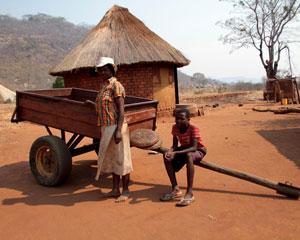
HUNDREDS of children could have dropped out of school in the past few weeks, as severe hunger hits Zimbabwe’s drought-stricken rural areas.
BY PHYLLIS MBANJE/CORRESPONDENTS
A snap survey by The Standard in the past week revealed that several children had dropped out of school, and more could join them as shortage of food at a household level becomes critical.
It emerged that older children were leaving school for gold panning, vending or taking up menial jobs to enable them to provide for their younger siblings.
One such child is Tafadzwa Mutyambizi (15), of Mbanga Village in Uzumba, who said hunger in the family worsened following the death of his father last year.
“I decided to quit school because my family needed me. Besides, I was being chased away from school every day for not paying fees,” he said. “I am the man now and I have to look after my mother and my four siblings who are still very young.”
There was no food in the house except for a small bag of maize meal, which they had bought for US$6 from another villager.
“In the morning, we have porridge with no sugar. It used to taste funny but now we don’t really mind,” said Mutyambizi. “Lunch is a luxury, but on good days we have beans donated by neighbours or well-wishers. Supper is boiled vegetables with sadza.”
- Chamisa under fire over US$120K donation
- Mavhunga puts DeMbare into Chibuku quarterfinals
- Pension funds bet on Cabora Bassa oilfields
- Councils defy govt fire tender directive
Keep Reading
This family is one of the many households that have been adversely affected by drought in Uzumba Maramba Pfungwe (UMP).
Most men have left their families to pan for gold along Pfungwe River.
Tinei Makokoro, a mother of four, also said the drought had reduced them to beggars.
“We implore the government to help us with food packs at moments like these.”
UMP chief executive officer, Eggrey Kanganga confirmed that there was hunger in the district but referred questions to district administrator, Michael Kadaira.
However, a council official who requested anonymity said the situation was most dire in the Pfungwe area.
“In areas like Magudu and Mungori, people go for days without eating anything,” he said. “Young boys are now quitting school and going into illegal mines.”
Education officials who spoke to The Standard last week said cases of children dropping out of school were most prevalent in dry parts of Manicaland, Matabeleland, Masvingo and parts of Midlands provinces.
A headmaster in Chimanimani said poor pupil attendance had become the norm at some schools in the district because of hunger.
“Some faint in class and we suspect it is because of hunger,” he said. “Some pupils come to school once or twice a week, on the days they would have eaten something.”
Zimbabwe Teachers’ Association (Zimta) president, Richard Gundane confirmed that children were dropping out of school because of hunger.
“There is evidence that pupils drop out of school and among many other reasons the issue of hunger is very pertinent,” he said. “In most rural areas a child might decide not to go to school because they are hungry or their parents drag them off to the field in a bid to secure food.”
Gundane urged non-governmental organisations such as Unicef to chip in.
Hunger also stalks villagers in Lupane and Mangwe district, where the food situation was also dire as they did not harvest anything due to drought.
“We did not harvest anything because of the drought and we are in urgent need of food aid,” said Linnet Nyathi (63) from Lupane district located in the western side of Bulawayo. “We just eat traditional porridge in the morning and sadza in the evening and wild fruits in the afternoon.”
During the launch of the National Food and Nutrition Security Policy early this year, President Robert Mugabe expressed concern at figures that showed that one in every three children is chronically malnourished in the country.
Mugabe said 25% of all deaths of children under the age of five were due to nutritional deficiencies.











